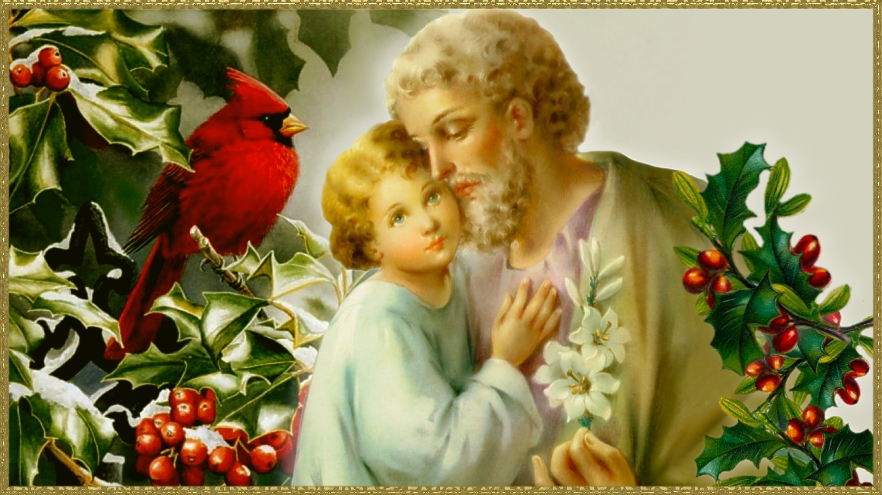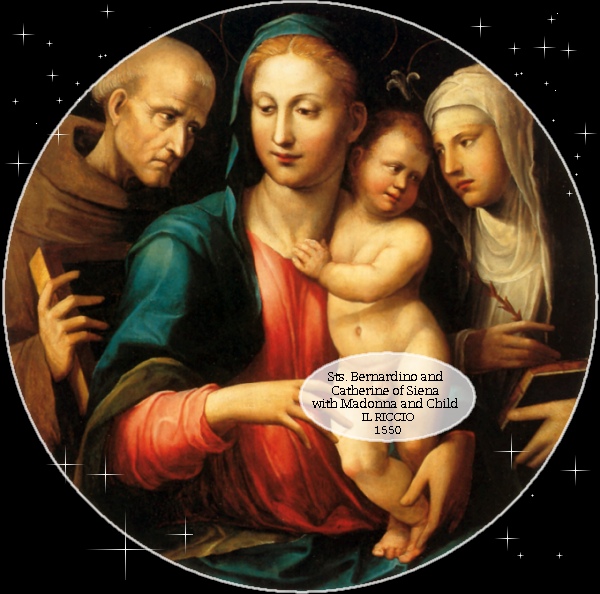 Christmas:  Motives for Devotion to St. Joseph Fr. Anthony A. Patrigani, S.J. With Eccles. Appr. CHAPTER 2 Second Motive of Devotion Towards St. Joseph---the Example of the Most Blessed Virgin. The ancient patriarch Joseph, from his earliest childhood, knew the glorious fortune which awaited him. God showed him, in a dream, the two principal stars of the firmament, the sun and the moon, inclining themselves respectfully before him. Thus the first Joseph was in some sort, we may say, the figure of the second, in whom the prophetic dream was most perfectly verified, when Jesus Christ, the true Sun of Justice, and Mary, the mysterious Moon, which communicated to the world the light of the Sun, rendered to Him, as to their chief, the most perfect obedience, and cheerfully depended in all things upon His direction. This is not all: another prophet, in a similar apparition, saw the same stars immovable in their proper spheres (Habacuc, iii.) In what earthly abode was such a prodigy ever seen, save in the holy house of Nazareth? That house was truly the abode of the Sun and Moon; but they were immovable, since they had no other motion than that which they received from St. Joseph. We have seen the Sun, that is to say the Son of God, submitting to the holy patriarch as to a father; we shall now contemplate the Moon, that is, the Mother of God, equally subject to Joseph, not only as to her spouse, but also as to her protector, and in some sort her father. Amid all the planets the moon is the most striking image of the sun; Mary also, among all the saints, has been the most perfect imitator of the virtues and actions of the Man-God. Now, amid the many examples she has left us, I find the respect she showed to St. Joseph. He was her spouse, as such she yielded to him and humbly obeyed him in all things. Yes, sweet Virgin, even had not the conjugal tie placed thee in a state of entire dependence upon him, thou wouldst have rendered him all the duties of the most respectful servant, were it only to conform to the example of thy Divine Son, which thou hadst ever before thine eyes. It is true that Mary knew that the Holy Ghost had given her as spouse a man perfected in all vitues---that alone was a sufficient reason for honoring him; but when she saw the Son of God obey him as His father, serve him as His master, and respect him as His lord, her esteem, veneration, and love towards her spouse greatly increased. She would have, so to speak, disputed with Jesus, in proofs of honor and respect; but not being able to attain to such humility, since it was the humility of a God, she found in this impossibility itself a subject of confusion, which feeling she made known to Joseph, as if to make up for what she could not do, not merely as spouse but also as servant,---thus imitating her Divine Son. Albert the Great gives a noble title to St. Joseph by calling him the Protector, the Patron of Mary (Patronus Virginis), because this saint zealously defended her honor and virginity when, still ignorant of the mystery of her being with child, he wished to prevent calumny from attacking her reputation, and therefore resolved to withdraw himself from her quietly. Such was the wisest course to take to avoid casting any suspicion upon her; but he afterwards undertook her defence with much more vigor when the angel had revealed to him the mystery, till then hidden from him. "Joseph, son of Davia, fear not to take unto thee Mary, thy wife, for that which is conceived in her is of the Holy Ghost." By which words the angel, or rather God Himself, declared Joseph the protector and guardian of that admirable purity, which, by a divine and special privilege, united in one and the same person the flower of virginity to the fruit of maternity, as Mary herself revealed to St. Bridget. (Rev., B. VI., c. lix.) From that moment, and through all succeeding ages, Joseph became an unimpeachable witness to the virginity of Mary against the outrageous calumnies which the spirit of error and heresy was one day to pour forth to tarnish its lustre. The Blessed Virgin, seeing her holy spouse inflamed by a zeal equal to that of the Cherubim who, armed with a fiery sword, guarded the terestrial paradise, gave him, herself, as St. Bridget declares, the glorious title of defender of her virginity. And this was well done, since, although she had conceived by the sole virtue of the Holy Ghost, still the protection of St. Joseph was necessary in order to preserve the reputation of the Mother as well as that of the Son, and to enable the latter to enter the world without dishonor. The heart of Mary being full of grace, is no less filled with gratitude; therefore we cannot express the measure of what she conceived to be her indebtedness towards her holy spouse, nor the eagerness with which she strove to prove her gratitude to him by acts of the most respectful submission and tenderest attachment. Suffice it to say, with St. Bernardine of Sienna, that Mary favored Joseph with the most precious gifts which a virgin spouse and virgin mother could bestow. As a virgin spouse she gave him her own heart, her immaculate heart, the living sanctuary of the Divinity, in order that, enriched with this treasure, he might have henceforth the right to say: In quality of spouse, I possess the heart of Mary---the purest, the most loving, and most amiable of all hearts is mine. As a Virgin Mother she gave him Jesus, the fruit of the tree of life, the source of every blessing. And what flames of love did not the Divine Infant enkindle in the heart of Joseph! with what torrents of joy did He not inundate his soul, in those delightful moments wherein God, who is the beatitude of the saints, smiled upon His adopted father, and rested in his arms! Did not Joseph alone possess greater treasures, more delight than the heavens and earth could contain? In the three words, Jesus, my son! he said more than the apostle St. Thomas, when he exclaimed, "My Lord and my God!"----more than the seraphic St. Francis, repeating a thousand times, "My God and my all!" Truly he was not the father of Jesus according to nature, but he had not on that account less authority over Him, nor less right to call Him son, by virtue of his position as spouse of His mother; and furthermore, did he not always prove himself a father, and the most tender of parents, by a love which no earthly father has ever equalled? Therefore, Mary confirmed him in the possession of this beautiful title, and bestowed it upon him on every occasion. "Ego et pater tuus quoerebamus te: Behold, Thy father and I have sought Thee."  It was not only towards the Man-God that St. Joseph showed himself a careful and tender father; towards Mary herself he acted more as a father than as a spouse or master. Therefore, Mary, to correspond to the sentiments of her humble, pure, and loving spouse, made it ever her duty to love, honor, and serve him with all the deference of a wife, or, to speak more properly, with all the submission of a daughter towards a father. She knew that the Eternal Father was with her spouse, and that He directed him in all his actions, as it is written of the ancient Joseph: she realized that He had established him as His lieutenant, and had confided to his care not only the God-Man, but also His Mother; therefore, as an obedient and respectful daughter, she had yielded up the direction of her conduct into the hands of St. Joseph, that he might dispose of her as he pleased. Joseph wills that Mary should accompany him in his journey to Bethlehem: she sets out immediately. He desires that she should take the new-born child and fly with him into Egypt: she follows without a word of complaint. Joseph remains for years in that heathen land: Mary does not ask the reason for so protracted an exile. Joseph issues the order to return to Judea: Mary follows him as a docile sheep follows its shepherd. It is not to her, but to her spouse that the angels manifest the orders of Heaven: she is not displeased at that, but even shows herself as prompt and exact in executing the will of Joseph, as the stars are to move on in their or- bits and to accomplish their revolutions. Pliny the Younger, in speaking of an empress whose praises he was celebrating, said: "A princess who has so great a hero as Trajan for her spouse, can fulfill no more glorious office than that of obeying him." Were you then, great Empress of Heaven, to be pleased to discover to us the sentiments of your heart, as you deigned to do to your beloved daughter St. Bridget, you could in glorification of your spouse repeat to us these short but comprehensive words: "I did not think it beneath me to prepare what was necessary for Joseph" (Rev., B. VII., c.xx:xv.); or these words, no less expressive: "I found delight in rendering him the most humble services." That is to say, O most admirable Virgin, that in the house of Nazareth, you, like Jesus, placed your glory in obeying Joseph implicitly. His wishes were to you as commands, his will was the rule of your conduct, and to it you conformed your thoughts and affections. In short, there were no services too painful, no labors too humiliating, to which you did not think it a duty to apply yourself, to prove to Joseph all the affection you feel for the most worthy of spouses, respect for the most zealous of protectors, and deference for the tenderest of fathers. Such was the homage rendered by the Mother of God to the adopted father whom God had chosen for Himself upon earth, and whom He had given to her as a spouse. But she was to do still more: from the throne which she occupies in the highest Heavens, she in some sort abases herself to serve him still further by the invitations she gives to all Christians to offer him their homage. Who does not know that, in the holy house of Loretto, which is no other, as we are aware, than that of Nazareth, where she had given, during her life, so many striking proofs of respect and obedience to St. Joseph, she ordered Father Balthazar Alvarez, of the Society of Jesus, her devout servant, to take the illustrious patriarch for his special protector? (See the Life of that Religious, ch. vi.) It was Mary who made another of her devoted servants, of the Premonstratensian order, change his name of Hermann to that of Joseph. (Surius, April 17.) She further commanded a Moorish slave at Naples, who was about to receive baptism, to take the name of Joseph, in memory of her holy spouse. (Father Segneri). And to thank St. Teresa for the glory which she had procured for St. Joseph, by extending his devotion throughout the Church, she came from Heaven to bestow upon her an inestimable present. (Life of the Saint, c. vi.) Finally, it was Mary who opened the Heavens to enable St. Gertrude to behold the incomparable brilliancy of the throne occupied by her holy spouse, and caused her to observe that at the name of Joseph, the Saints in Paradise, bowed their heads to do him honor. (Rev., B. IV., c.xii.) If, then, Mary has left us these striking examples of respect and obedience towards St. Joseph, and if now that she can no longer serve him in Heaven, where they both reign in so much glory, she excites her devoted children to become also the devout servants of her spouse, and to honor him with a peculiar title; who is there among us who would think himself dispensed from revering him and rendering him homage? I know that all Christians profess, though with more or less fervor, to give Mary the first place in their hearts, after Jesus. But how can they flatter themselves that they love them, if they do not also love him whom Jesus and Mary cherished with so tender an affection? A pious lady, named Anne Kertai, first undertook to introduce the devotion to St. Joseph into Tyrnau, in Austria, where that to the Blessed Virgin was already flourishing. She succeeded in executing her project by raising a chapel to the Saint in the Church of the Jesuit Fathers. The devotion of the inhabitants of Tyrnau towards Mary was doubtless a jewel of great price in her eyes, but she desired to see it encased in gold which should heighten its brilliancy. The desire to add so beautiful an ornament to the devotion towards Mary, induced her to exert all her zeal to inspire her fellow-citizens with an affection towards St. Joseph similar to that which they bore to the Blessed Virgin. Some may, perhaps, object that, by adopting so many different devotions, we divide our hearts, since what is given to one is as so much taken from the other. This is an imaginary fear, as experience makes it evident that devotion towards Joseph, far from diminishing that towards Mary, only increases it. We do not take our heart from Jesus to give it to Mary, nor do we take it from Mary to bestow it on Joseph. The mutual affection existing between Jesus, Mary, and Joseph, made of the Holy Family but one heart and one soul, cor unum et anima una: it will be the same with regard to the devotion which will reunite these three august persons in our heart. Many saints are of this opinion: according to St. Magdalen of Pazzi, St. Joseph takes especial care of the faithful who fight under the banner of Mary; another Saint declares that whoever will be truly devout to Joseph will be equally so to Mary; so true is it that these two admirable spouses, like two harps tuned in unison, form together a most perfect harmony. Honor, therefore, St. Joseph, and do not fear to do too much for him, since the honor which you render to the husband will necessarily revert to the wife, by virtue of the affection which unites them; besides which, among married people, even by human laws, there is a perfect community of honors and wealth. TO GO EITHER BACK OR FORWARD, CLICK THE ANIMATED STARS  E-MAIL E-MAIL HOME---------------------------------ST. JOSEPH DIRECTORY www.catholictradition.org/Christmas/saint-joseph2.htm |